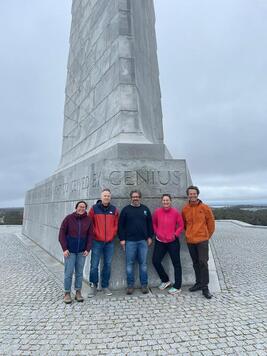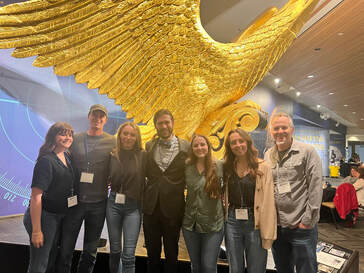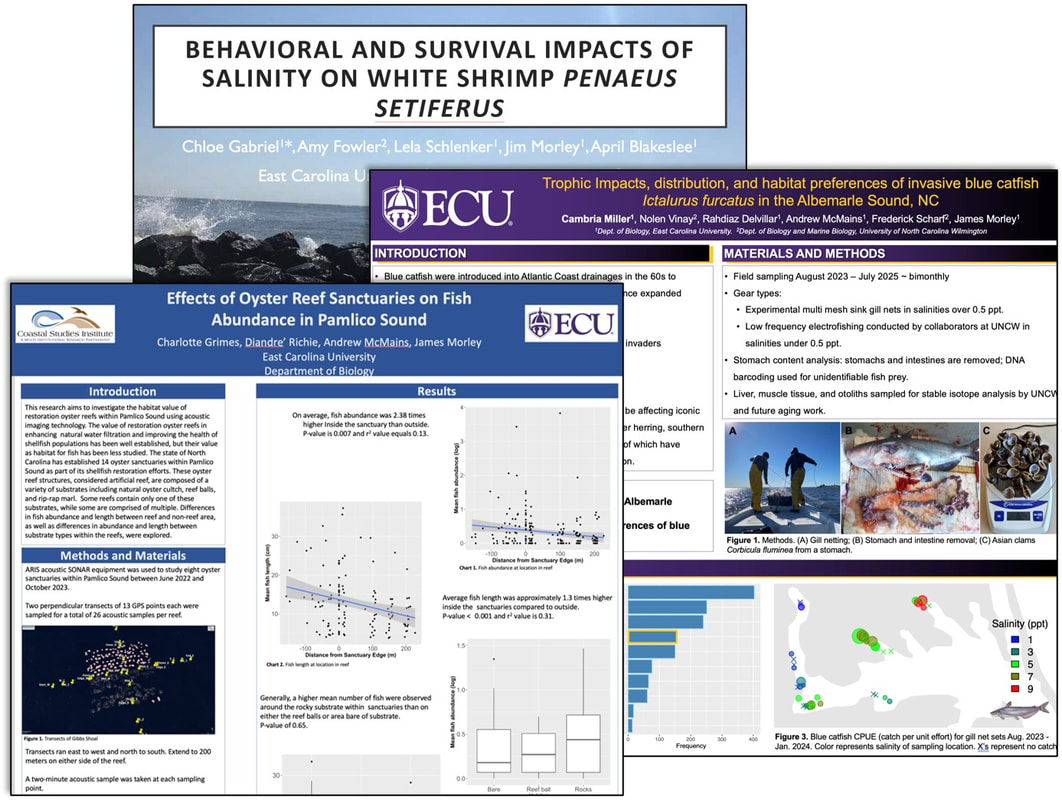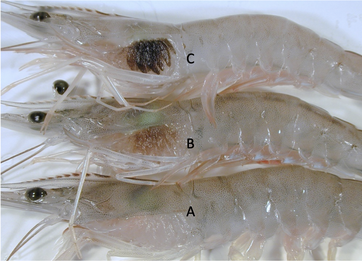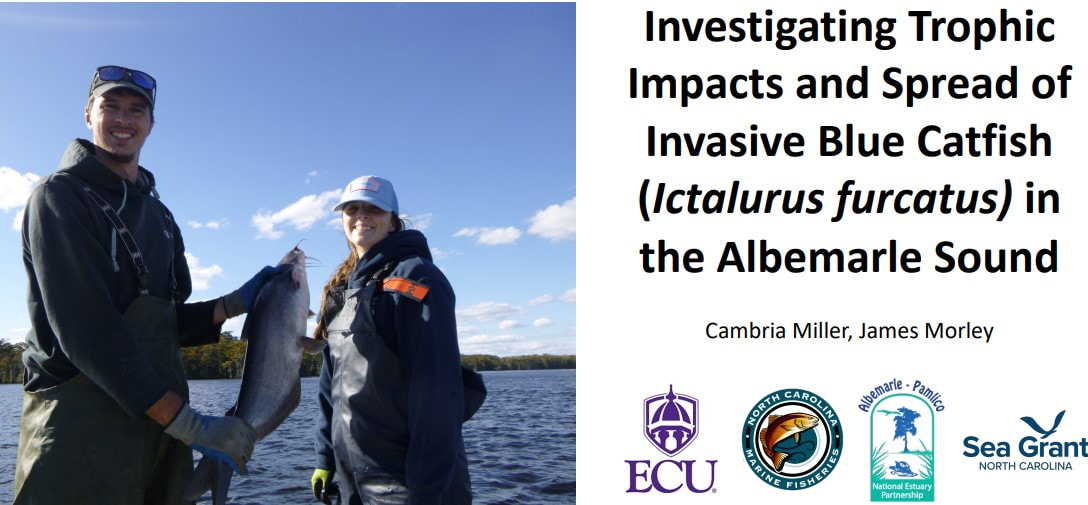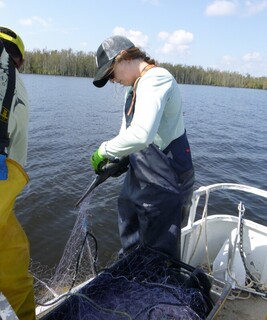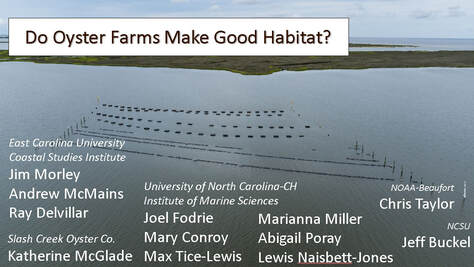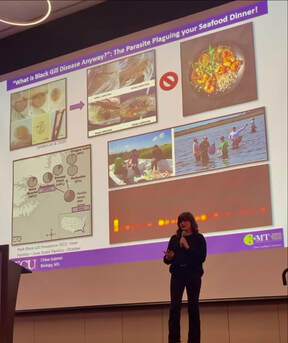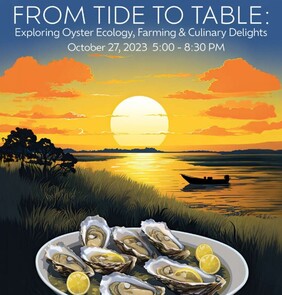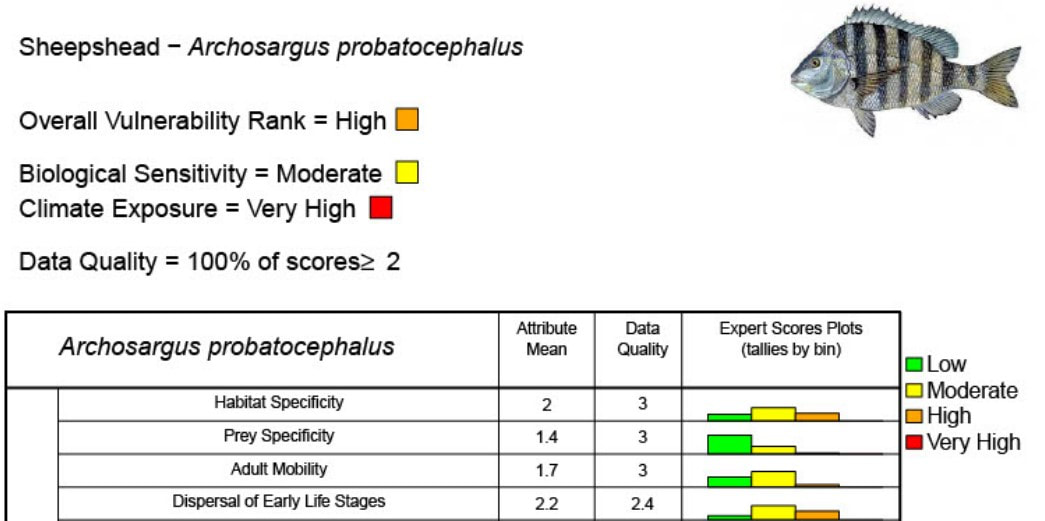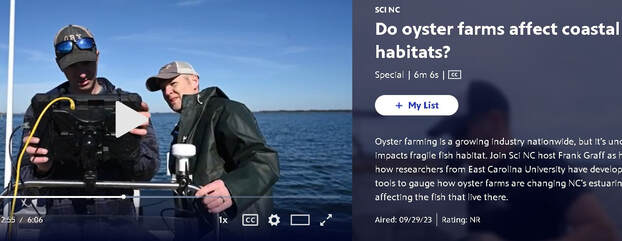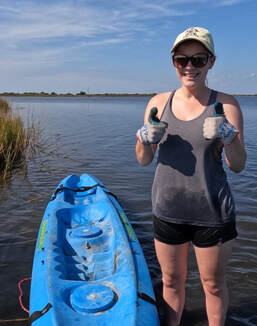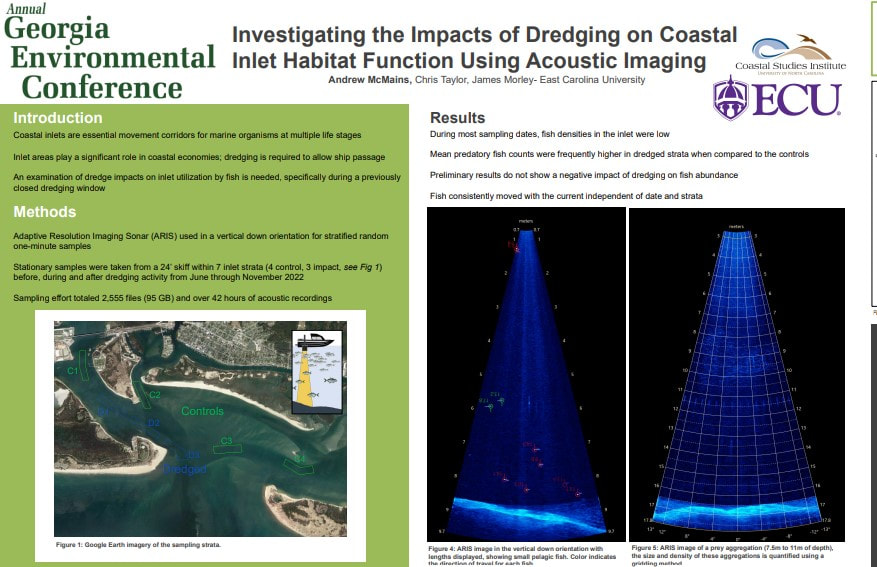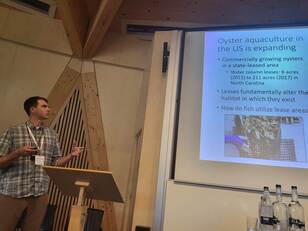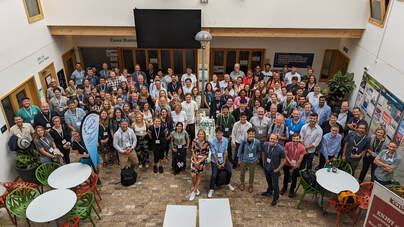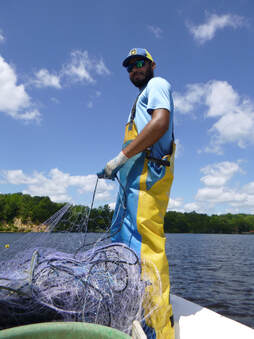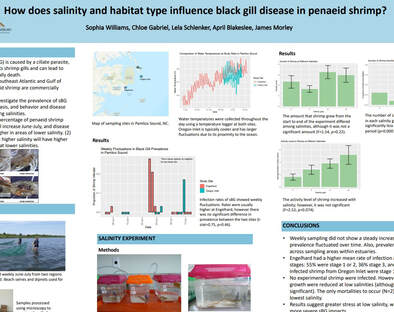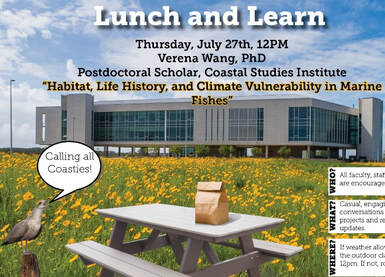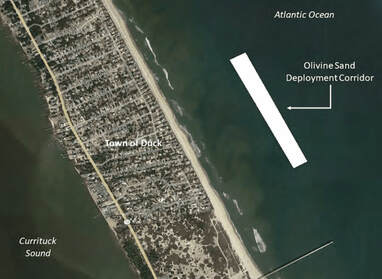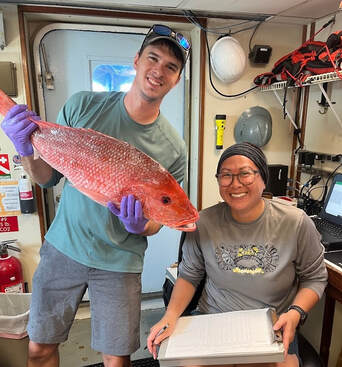|
JULY 2024
Andrew volunteers on NOAA research cruise The NOAA Southeast Fisheries Science Center conducts an annual survey of reef fishes off the southeast Atlantic coast. This survey provides important biological and abundance data for the management of many important fisheries (including Red Snapper). Andrew recently returned from volunteering for a two-week leg of this survey. He spent much of his time at sea catching fish in traps and then collecting data and biological samples from specimens. Andrew also participated last year, and multiple members of the Fisheries Lab have volunteered on this survey during the past three years. |
|
Maddie defends masters thesis Our lab's second graduate student of the summer has successfully defended her thesis. Maddie's research was focused on estimating birthdates of juvenile sheepshead, and better understanding their habitat use. This information will be useful for managing a popular sportfish that has had historically limited life history information. |
|
JUNE 2024
New paper on seasonal patterns of shark & ray abundance The coastal ocean off NC has high seasonal variability within the elasmobranch assemblage (shark, skates, rays). This variability is due to the north-south or inshore-offshore movement of species with seasonal temperatures. A new paper (LINK) describes these patterns, based on data from over 21,000 elasmobranchs that were captured, counted, measured and released over the course of four years. The results will help describe habitat use for many poorly known species. |
|
Cami presents to NC Sea Grant Advisory Board The North Carolina Sea Grant Advisory Board is comprised of a diverse group of representatives, whose goal is to help guide NCSG in setting priorities. This month, Cami presented her research on invasive blue catfish in Albemarle Sound to this group. This fall, Cami's research is being funded in part by a fellowship from NCSG. |
|
Summer joins the lab as an REU student The Fisheries Lab is hosting an undergraduate student to conduct independent research through the REU program, which we have done for the past three years. Summer Duba, a student at Christopher Newport University in Virginia, will be working with our lab to study black gill disease in shrimp. Over the next two months, she will conduct a field experiment that examines how shrimp black gill infection varies in different habitats. Summer will also be sampling shrimp in multiple regions of Pamlico Sound to compare black gill prevalence. |
|
MAY 2024 Chloe defends masters thesis For the past two years, Chloe Gabriel has been conducting research on the host-parasite dynamics of black gill disease in shrimp. She has also experimentally examined low salinity tolerance in white shrimp. Her work is providing the first data on black gill disease in North Carolina shrimp, which might inform how monitoring is conducting by NC Division of Marine Fisheries in the future. Chloe is going to be staying at ECU for another year and working as a research technician on shrimp black gill disease, with the Blakeslee and Morley Labs. |
|
Verena begins new job with the Gulf of Mexico Fishery Management Council Dr. Verena Wang has been a postdoc in our Fisheries Lab for over 3 years, working as the primary analyst on multiple projects related to climate change and ecosystem shifts. This month she is beginning a new job with the Gulf of Mexico Fishery Management Council, stationed in Florida. Verena will serve as an Ecosystem Analyst, where she will work to enhance ecosystem-level strategies for fisheries management in the GoM. While CSI might be losing its most skilled statistician, we are excited that Verena will be on the front lines of adapting fisheries policy to ecosystem changes! |
|
APRIL 2024 Cami and Andrew conduct Shad in the Classroom Shad in the Classroom is a collaborative project between local schools and scientists, where researchers teach students about our local anadromous species of river herring and shad. Cami conducted lessons at Perquimans High School, and Andrew led lessons at First Flight Middle School in Kill Devil Hills. Collectively, they taught over 100 kids about fish anatomy and ecology. |
|
Chloe and Charlotte present their research at multiple venues Both Chloe and Charlotte presented their thesis work at the ECU Research and Creative Achievement Week (RCAW). Chloe presented results from her shrimp-salinity experiment, while Charlotte shared results from acoustic sampling artificial reefs in Pamlico Sound. Chloe also presented her work at the annual Benthic Ecology Meeting in Charleston, SC. Charlotte also presented a poster at the ECU Biology Department Undergraduate Symposium. |
|
MARCH 2024
Fisheries Lab hosts workshop on species distribution and climate Verena and Jim hosted colleagues from several different institutions from around the country for several days. The group discussed an ongoing project examining how species life history might impact responses to climate change. A number of fisheries managers and scientists from the mid-Atlantic and Gulf of Maine regions also joined remotely to discuss how research results might integrate with policy. Despite some wet weather, our group still had time to visit some sites on the OBX! |
|
Fisheries Lab attends annual Tidewater AFS Conference The Fisheries Lab attended the annual Tidewater Chapter Conference, which is part of the American Fisheries Society. The meeting was held in Newport News, Virginia. The meeting marks the completion of Jim's service as former president of the chapter. Andrew and Caid continue to serve as officers on ECU's AFS student subunit. |
|
FEBRUARY 2024
New project to expand shrimp black gill research The Blakeslee and Morley labs are receiving new funding from North Carolina Sea Grant to continue our research on the parasite that causes black gill disease in shrimp. This research will include sampling shrimp from across the state to estimate infection rates, and using field and laboratory approaches to examine how habitat and water quality impact infection. In other states, black gill disease has been linked to declines in the shrimp fishery. |
|
JANUARY 2024
Cambria presents to Aquatic Nuisance Species Committee The NC Aquatic Nuisance Species (ANS) Management Plan Steering Committee is a multi-agency group that is working to revise and finalize objectives for a state-level plan for managing invasive species. Cami joined one of the committee meetings and presented her research on trophic impacts of blue catfish, which are listed as a high-priority species in the ANS Management Plan. |
|
DECEMBER 2023 Cambria awarded APNEP & Sea Grant Graduate Fellowship Each year the Albemarle-Pamlico National Estuary Partnership and NC Sea Grant award one graduate student a $10,000 fellowship to conduct research in NC estuaries. Cambria was awarded the 2024 fellowship (LINK). She will be using the funds to support her research on invasive blue catfish and their indirect impacts on water quality. Blue catfish are feeding on clams in the Albemarle Sound, which may reduce the amount of natural water filtration. |
|
Jim presents to NC Oyster Steering Committee The Oyster Restoration and Protection Plan for NC is provided oversight by the Oyster Steering Committee, which meets routinely to discuss progress towards objectives. This month, Jim presented our Lab's research to the committee, providing a broad overview of the multiple projects we've conducted that examine the habitat impacts of oyster culture. |
|
NOVEMBER 2023 Chloe presents her research at annual ECU competition The Three Minute Thesis is an international competition for graduate students, and ECU hosts an annual 3MT event. The rules for this competition are that students have three minutes to present their work, using only a single slide. Chloe scored well in the competition, presenting her work on black gill disease in shrimp, and contributed significantly to our department's performance. In fact, Biology took home the Department Cup! |
|
OCTOBER 2023 CSI hosts event to promote oyster culture An oyster-themed dinner was hosted at CSI, featuring locally grown cuisine. People in attendance included local Dare County residents, business owners, oyster farmers and distributors, and a local non-profit group. Jim presented our Lab's research on oyster farm impacts on estuaries, and also sat on a Q&A panel with the NC Coastal Federation's Oyster Program Director, and local oyster farmers. |
|
New report assesses climate vulnerability of southeast species Over the last 10 years NOAA has been rapidly assessing the vulnerability of hundreds of marine and estuarine species in U.S. waters to climate change. The methods they are using involves a combination of expert judgement by scientists and also climate modeling output. The assessment for southeast U.S. species has recently been published as a technical report. Jim was a contributing author. LINK |
|
Fisheries Lab featured on Sci NC Andrew and Jim were recently featured on the PBS show 'Sci NC' to talk about their research on oyster culture farms. The segment also focuses on our use of acoustics technology to gather data on habitat function of oyster farms. Watch the video here (LINK). |
|
SEPTEMBER 2023 Ella joins lab as an OBX Field Site intern Each fall semester CSI hosts a group of undergraduate students from UNC-CH as part of the OBX Field Site. In addition to coursework, students get hands-on research experience. Ella will be working in the Fish Lab, where her primary job will be to measure fish abundances over artificial reef material in Pamlico Sound using acoustic imaging technology. Her work will support our lab's ongoing project examining the oyster sanctuaries in NC. |
|
AUGUST 2023 Andrew presents at Georgia Environmental Conference The Georgia Environmental Conference hosts a mix of business, industry, governmental, and academic scientists and consultants. Andrew was awarded a scholarship by the GEC to attend and present his research. He shared results from his work on coastal inlet habitat function, giving both a poster (LINK) and oral presentation. |
|
Andrew selected as the International Fisheries Section Fellow Each year the American Fisheries Society awards one graduate student with the International Fisheries Section Fellowship (LINK). Andrew was selected as the 2023 fellow and AFS funded his trip to England where he presented his research at the annual symposium of the Fisheries Society of the British Isles. At this international conference, Andrew shared his work on fish movements around commercial oyster farms. |
|
Ray Delvillar joins the lab as a technician Over the past couple years Ray has regularly volunteered his time to help our lab conduct fieldwork. He also conducted independent research with our lab during the summer of 2021, as part of his undergraduate program. Ray is now being brought on as a paid technician, primarily to help with our blue catfish diet study in the Albemarle Sound. Ray is currently a senior in the biology program at ECU. |
|
How does Black Gill Disease in shrimp vary at short time scales? Sophia recently participated in a poster presentation social at CSI, which marked her completion of the REU program. Her independent research this summer effectively demonstrated that black gill infection of brown shrimp can vary substantially from one week to the next, and infection can also vary over small distances in an estuary. With an experiment on brown shrimp, Sophia also found evidence of physiological stress at low salinities. Her results will do a great deal to inform future sampling and experimental research for this parasite-host relationship. View her poster here LINK. Sophia will be returning to Florida State U. for her junior year. |
|
JULY 2023
Verena gives seminar at CSI CSI hosts a semi-weekly Lunch-&-Learn seminar series. The series typically features ECU scientists who present about ongoing projects. This month Verena spoke about her ongoing research that is examining how marine fishes shift their habitats as they progress through their life cycle. |
|
New project examining impacts of carbon capture mineral
The Army Corps of Engineers Research Facility on the Outer Banks recently hosted a stakeholder event to help kick off a new project. The company Vesta, is planning an experimental deployment of the carbon capture mineral called Olivine off the Outer Banks. The Fisheries Lab, along with other CSI scientists, are partnering with Vesta to examine potential impacts of this mineral on the ecosystem. At the stakeholder event held this month, Jim sat among a panel of scientists (including Paul Paris from CSI) to answer questions from members of the NC Division of Coastal Management, Division of Marine Fisheries, local town leaders, and others. |
|
Verena and Andrew volunteer on NOAA research cruise The NOAA Southeast Fisheries Science Center conducts an annual survey of reef fishes off the Atlantic coast between North Carolina and Florida. This survey provides important biological and abundance data for the management of many important fisheries (including Red Snapper). Verena and Andrew volunteered for a two-week leg of this survey. They spent this time at sea catching fish in traps and then collecting data and biological samples from specimens, such as otoliths to be used for aging fish. This is the second year that members of the Fisheries Lab have volunteered; Verena and Maddie also participated last year. |









